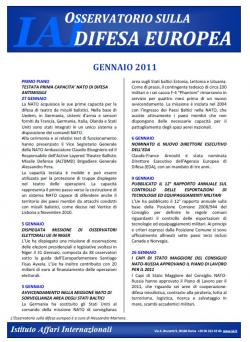Observatory on European defence, October 2010
IN THE SPOTLIGHT: October 29, 2010
FRONTEX DEPLOYS THE FIRST RABIT (RAPID BORDER INTERVENTION TEAM)
The European agency for external border security “FRONTEX” has sent a rapid intervention team (Rapid Border Intervention Team, or RABIT) of 175 officials at the border between Greece and Turkey. The officials come from 24 different countries belongin or associated with Schengen. The decision was taken after a request of the Greek government, unable to manage an unusually large flow of illegal immigrants from Turkey. It's the first time that a European RABIT is deployed on the ground.
The mechanism for the creation of RABIT was approved by EU Council in July 2007. RABIT are composed of national experts of the border control (border guards, police officers and experts on immigration), and can be deployed with a notice of few days. The RABIT officials have a duty to assist local authorities in border management, and they act under the direct control of an official of the host country. The dispatch of a RABIT is at discretion of the Executive Director of Frontex. The request for a Rabit must be from a member country of the EU who is facing an exceptional situation and has already fielded national resources for the emergency. The permanence of a team on the field should not exceed two months.
October 1, 2010
EU WITHDRAWS THE MISSION IN GUINEA BISSAU
The European mission to support the reform of the security sector in Guinea Bissau (EU SSR Guinea-Bissau) concluded its mandate on September 30, 2010. The mission aimed to provide assistance for the implementation of the National Strategy for the reform of the security sector, which aims at the reduction and reorganization of the armed and security forces in Guinea. In this situation, the mission, composed by 8 units (civilians and military), contributed to the drafting of laws and organizational documents related to armed forces, police and the judiciary.
The European Union had declared its willingness to consider a new mission to continue to help the democratic development of the forces of Guinea, but recent events have made it impossible. The country now faces a serious instability. Over the past two years there have been two major army mutinies; during one of these the Prime Minister and the Chief of Staff were taken hostage. The actual Chief of Staff, who took office in July of this year, was the same officer who led the mutiny.
October 29, 2010
CUT IN KOSOVO NATO CONTINGENT
NATO Secretary General Anders Fogh-Rasmussen has stated that NATO will reduce its contingent in Kosovo by 5,000 units by early 2011. The Kosovo Security Force (KFOR) will drop from 15.000 to 10 000 units.
The decision was motivated by Rasmussen due to the progressive improvement of local security conditions, despite the Kosovo continues to face a heavy institutional instability. The cut coincides with a more marginal role of KFOR in Kosovo security.
-
Details
Roma, Istituto affari internazionali, 2010, 1p. -
Issue
10/10



